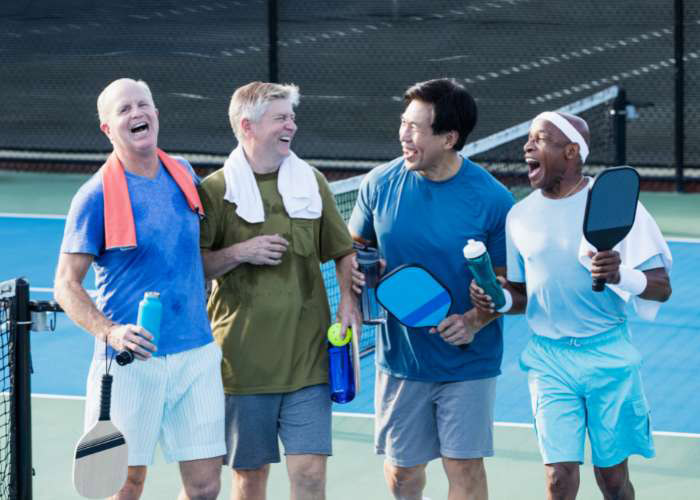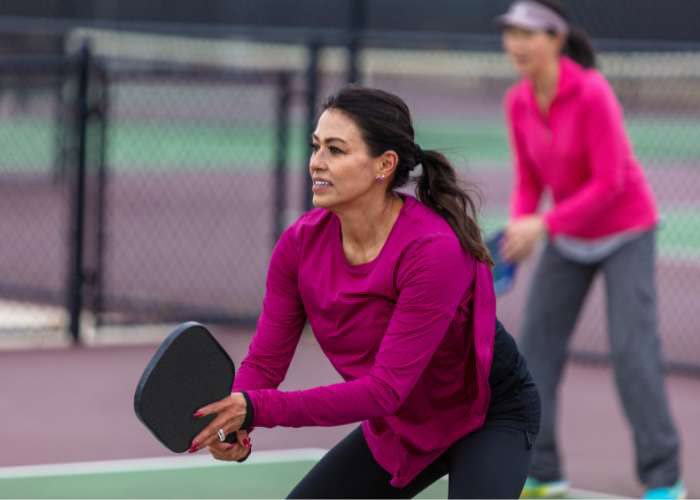Where did Pickleball come from?
Unless you’re living in a cave without internet or TV reception, you’ve probably heard of pickleball. Afterall, everyone and their mother, is playing (or learning to play) pickleball! And yes, it’s new(ish) – Well the “craze” for pickleball is new. In fact, between 2019 and 2022, pickleball has grown 40% making it the fastest growing sport in America. 4.8 million Americans have become “picklers.”
Pickleball really began in the 60’s when two dads decided to “invent” something to entertain their families. I think we can safely say the pandemic helped make pickleball popular – when people were looking for something to cure the boredom, get them off the sofa and do something fun that still allowed “social distancing.” Pickleball could be played without a lot of investment and without having a high skill level.
What is Pickleball?
Good question! Most people have either taken up the sport or know someone who has. For those of us just catching up, Pickleball is a hybrid combination of ping-pong, tennis, and badminton. It appeals to both older and younger age groups because you don’t need to be a born athlete to take up the plastic paddle-type racket. Most racket sports have a steep learning curve and require a certain level of athleticism. Pickleball uses a plastic whiffle-like ball that is slower (than a tennis ball or racquetball) making it less bouncy and less likely to make you run all over a court, missing said ball. The courts for pickleball are much smaller than a tennis court and most players play with a partner (doubles.)
For the observer, Pickleball looks more like a rowdy game of bocce ball or cornhole. Good-natured arguing and yelling matches–with a beer in one hand (White Claw for the younger set) and a paddle in the other–are encouraged. 80-year-olds can play right along with 20-year-olds and it’s all great fun, while still allowing for a bit of a workout.

What are common Pickleball injuries?
It’s true, Pickleball is a sport with fewer injuries across the board. However, injuries can still occur. The most common injury you might experience is shoulder pain. Shoulder pain can be caused by something as simple to treat as bursitis, or something more involved like a rotator cuff tear. Here are some very common Pickleball sports injuries I see in my office: (link to articles)

When should I see a doctor about my Pickleball injury?
If you are just starting your Pickleball adventure, sore muscles can be common. I tell my patients in New York and the surrounding boroughs that any soreness or pain that continues beyond a week, should be evaluated. Pain that does not resolve, especially pain that keeps you awake at night is serious enough to make an appointment.
If you are playing Pickleball and feel any sharp, severe pain in the hip, knee, or shoulder, these could indicate a serious problem and you should have it evaluated right away. Most Pickleball injuries can be treated non-surgically, with conservative measures; however, there are some injuries that need to be taken care of as soon as possible. Dr. Benedict Nwachukwu treats patients from Manhattan, Brooklyn, New York City and surrounding New York boroughs who are experiencing hip, shoulder or knee pain after playing Pickleball.
How to play Pickleball safely:
According to an injury study done in 2021, Pickleball has been deemed safer than tennis and better for individuals with heart problems. As with any sport, even pickleball can have some risk for injury. The best way to avoid injury while playing pickleball are fairly straight forward:
- Warm up before playing!
- Stretch your muscles, including neck, shoulders, torso, arms and legs
- Walk slowly – working up to a brisk walk or slow jog
- Stay hydrated – Drink plenty of water before, during and after your match
- Stretch afterward
- See Dr. Nwachukwu if something starts hurting!
For additional information on common Pickleball injuries, or to find out if your soreness requires medical intervention, please contact the office of Benedict Nwachukwu, MD, orthopedic specialist serving Manhattan, New York City and surrounding New York boroughs.





